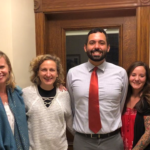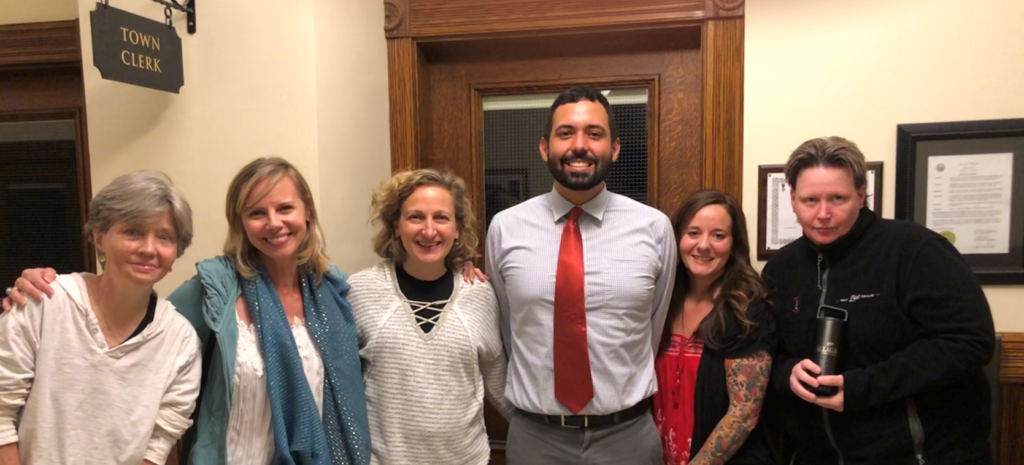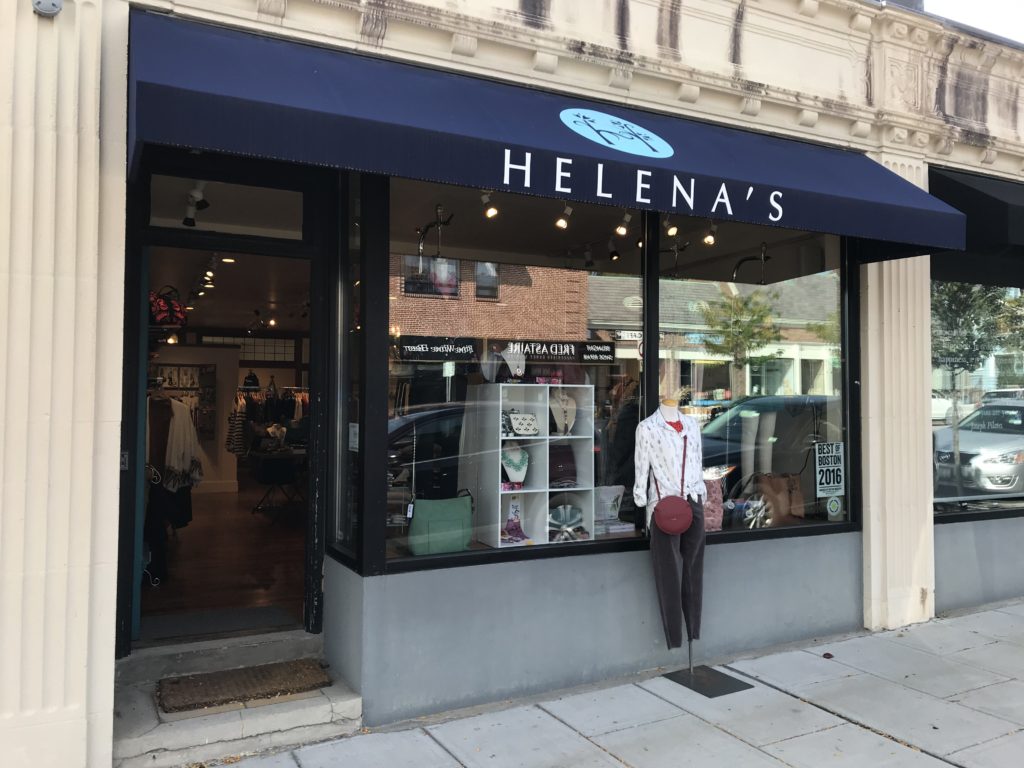
By Katherine Venzke
Around town there is constant talk about the state of business in Belmont. How is Belmont Center faring with the new-ish parking meter system? What’s with all the new development in Waverley Square? And how will the Bradford development affect commerce in Cushing Square? These discussions happen on the sidewalks, in cafes, at Town Hall, and in the local media. They also happen, often, at my shop.
This “talk” found some direction and mission last year with the formation of the Belmont Business Study Committee (BBSC). The town pulled together business owners from each of the Belmont business districts to create a charter for a future Economic Development Committee. In short, the BBSC would identify pressing economic issues. I was the committee representative from Cushing Square.

The Belmont Business Study Committee the night of their Select Board presentation. Left to right: Kathleen Crowley, Belmont Books; Katherine Venzke, Helena’s; Wendy Etkind, Oracle Retail: Raul Gonzales, MAPC; Emma Thurston, Damnation Alley Distillery; Suzanne Schalow, Craft Beer Cellar. Photo by Jeffrey Wheeler.
How I Came to Belmont
I own two locations of a women’s clothing store called Helena’s. My original location is on Massachusetts Avenue in Arlington. In the fall of 2011, I pursued opening a second location. My shop in Arlington was successful, and I was ready to grow. There was only one location I was looking at to expand in suburban Boston: Belmont’s Cushing Square.
To me, Cushing was charming and tidy, a vestige of a classic New England merchant’s district. It was loaded with women-owned businesses and had a promise of a massive mixed-use development. A local real estate developer was poised to clean up an abandoned block and turn it into a bustling residential and commercial destination, and in the process boost Cushing Square to the status of Belmont Center.
I renovated a former yoga studio and opened Helena’s at 453½ Common Street in March 2012. At that time, Chris Starr was actively rallying the businesses to support him at town and community meetings to get his Cushing Village development approved. We went, we rallied. The town approved the project and we all waited for the glory to ensue.
In the meantime, I built a loyal customer following. The adage, “Belmont residents shop Belmont,” turned out to be true. I connected actively with my neighbors and settled in. Almost eight years later, that development is not complete. It has changed ownership and is plagued with lawsuits and counter-lawsuits.
My business is successful in large part due to my philosophy on networking: get involved and connect. This means keeping my head up, supporting my neighboring businesses, and paying attention to what is happening in the towns where my shops reside. It’s part compassion and part strategy, but entirely about mutual success.
Challenges in Belmont
Within about five years of opening my store in Belmont, the Watertown-Belmont Chamber of Commerce closed. This group had been acknowledged as a more “Watertown-focused” organization. Often in a multi-town chamber, unintentionally, one community dominates the others in terms of membership and focus. In any event, it was a business organization for merchants in Belmont, and it shut down.
Another Belmont challenge is the lack of an economic development coordinator position in the town government. An economic development coordinator or director usually works for/with the planning department and in collaboration with community development. This expert often undertakes active outreach to support business owners and help new businesses get off the ground. An economic development coordinator is crucial for generating change and progress in a community.
Earlier this year, I attended a dynamic economic development conference in Boston. It was a lively and informative event called Exile on Main Street.
The experts included economic development coordinators from urban and suburban municipalities, developers who envisioned vibrancy beyond their specific projects, and both permanent and pop-up/seasonal business owners.
This conference emphasized that a municipal economic development department is essential to the future success of a community’s business districts. Many of the panel speakers were staffers in this role, in communities such as Ashland, Arlington, and Lowell. Even developers nodded to this notion, with one Boston developer saying, “If the town you are looking to move into does not have an economic development department, that tells you something about that community, and you should reconsider bringing your business there.”
In Belmont, to make up for lack of an active chamber or economic development coordinator, some neighborhoods have organized. Belmont Center has a business association, and owners of a few anchor businesses in Cushing Square came together to form the Cushing Square Merchants’ Association (CSMA) in 2015. Mary Thomajan of Westcott Mercantile led this group of retailers, cafes, and service businesses into a cohesive and productive unit. I served on the CSMA’s executive board.
The town responded to the formation of the CSMA with support and enthusiasm, especially in the tenure of Patrice Garvin, town administrator. When our CSMA executive board asked to meet with town officials to discuss ongoing issues in Cushing Square, including safety, parking, and beautification, they showed up. We had the ear of Patrice, Glenn Clancy, Ben Mailhot, Jay Marcotte, Mike Santoro, Craig Spinelli, and other folks, who listened and made attempts to help. These sessions around the conference table in the Select Board’s Meeting Room were helpful to all parties.
The Success of the Belmont Business Study Committee
In the summer of 2018, the town announced the formation of a Belmont Business Study Committee (BBSC). They were soliciting applications from Belmont business owners to fill the committee positions.
I threw in my hat as the representative from Cushing Square. Business owners representing Belmont Center, Waverley Square, and the “other” district which falls under none of those areas, and a non-business-owning Belmont resident comprised the final committee. Our mission was to create a charter for a later, yet-to-be-formed economic development committee.
Two successful aspects of the BBSC were a dedicated membership with years of business experience and the commitment and support from the town. Patrice Garvin procured a grant to hire a consultant from the Metropolitan Area Planning Council (MAPC) to drive our endeavor. Raul Gonzales, a senior planner at MAPC, was our consultant. Another committee member was Jeffrey Wheeler, Belmont’s senior planner, who provided insight and history into the town’s Master Plan.
One of the committee’s most significant actions was a town-wide survey that went out to business owners in February. The town actively promoted this survey. In the end, the BBSC received 120 responses.
The BBSC worked over nine months and presented our work to the Select Board on August 26 of this year. The presentation was thorough and brief. The Economic Development Plan, which includes 12 recommendations, and results from the survey can be found on the town website .
The recommendations include:
- Creating a position to serve as economic development coordinator in Belmont
- Reviewing zoning and permitting procedures to streamline business regulation and expedite permitting
- Creating information guidelines to assist businesses in locating and expanding in Belmont
The Select Board was receptive and responsive to the suggestions. Addressing the unusually large response to the town business survey, Adam Dash said, “I think there has been a pent-up demand for the town to hear their concerns. Because we get them in little dribs and drabs and when you actually go out there, I think the floodgate of frustration was heard from some people.”
Town residents care about the success of the business districts that abut and surround their schools, churches, and neighborhoods. In recent years, there is a clear message through action that town government cares as well.
Currently the Select Board is reviewing BBSC recommendations. Some of these recommendations are easier to implement than others. I recognize that creating an economic development coordinator role requires dollars that the town does not have in the budget. But hopefully, the town and the business community can work toward common goals.
Select Board chair Thomas Caputo wrapped up the BBSC presentation with these words, “It is now incumbent upon us to make sure their voices are heard and DO something about it, right? The worst thing we could do is go through this great work and then not move the ball.” The three Select Board members enthusiastically agreed that they would not let that happen.
Katherine Venzke is the founder and owner of Helena’s, and is on the executive board of directors for both the Arlington Chamber of Commerce and the Cushing Square Merchant’s Association. She lives in Lexington with her husband and three children. In November 2019, Katherine relocated her Belmont boutique to Leonard Street from Cushing Square.



Sorry, the comment form is closed at this time.